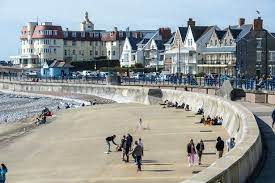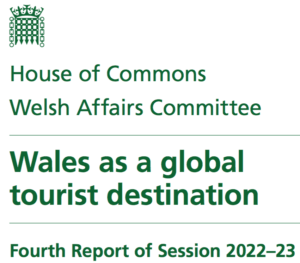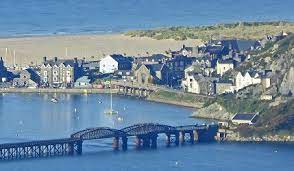- ‘Lies, damned lies etc…’ - 13th February 2026
- Missing in action - 12th February 2026
- Travel news again - 11th February 2026

For our Editor, Welshman Phil Parry monitoring the latest research, as well as keeping abreast of cultural changes, have always been central, and now reports are indicating that seaside towns in Wales and the rest of the UK, are succeeding.
Previously Phil has described how he was helped to break into the South Wales Echo office car when he was a cub reporter, recalled his early career as a journalist, the importance of experience in the job, and made clear that the ‘calls’ to emergency services as well as court cases are central to any media operation.
 He has also explored how poorly paid most journalism is when trainee reporters had to live in squalid flats, the vital role of expenses, and about one of his most important stories on the now-scrapped 53 year-old BBC Cymru Wales (BBC CW) TV Current Affairs series, Week In Week Out (WIWO), which won an award even after it was axed, long after his career really took off
He has also explored how poorly paid most journalism is when trainee reporters had to live in squalid flats, the vital role of expenses, and about one of his most important stories on the now-scrapped 53 year-old BBC Cymru Wales (BBC CW) TV Current Affairs series, Week In Week Out (WIWO), which won an award even after it was axed, long after his career really took off
Phil has explained too how crucial it is actually to speak to people, the virtue of speed as well as accuracy, why knowledge of ‘history’ is vital, how certain material was removed from TV Current Affairs programmes when secret cameras had to be used, and some of those he has interviewed.
Earlier he disclosed why investigative journalism is needed now more than ever although others have different opinions, and how information from trusted sources is crucial.

I have a great respect for our seaside towns.
A tribute to their continued survival can be found in the hit network television programme ‘Bargain Loving Brits By The Sea’.
Despite everything they have hung on in there, even though a visit to one of them might give you a taste of a by-gone era, and people have been predicting their demise FOR YEARS!

One Welsh seaside resort I went to recently promised “Colour tv in all Bedrooms”, another “Ballroom for Various Dancing Groups” and there was the ominously opaque “Evening Entertainment” (unlikely to be as entertaining as it once was: many of the waitresses in early holiday camps were, according to one academic, prostitutes).


Yet through it all they have remained popular to Brits, partly because they are (relatively) near to where families live.
Britain is so narrow that everyone is within 75 miles (120km) of the coast—but it is not just that.
More than 5.3 million people actually RESIDE in the coastal towns of England and Wales, and they remain incredibly popular for visitors too.

There was an annual average of 12.5 million visitors to Blackpool between 2017 and 2019, while Oxford attracted only 8 million.
The recent heatwave around the Mediterranean further strengthened the allure of beach holidays in the UK.
Under the headline: “By 2050, Bognor may be Britain’s Barcelona”, The Sunday Times (ST) reported last month how ‘staycations’ were very much in fashion.

All this stands in stark contrast, however, with the countryside where worries have been raised – about Wales particularly.
The Welsh Affairs Select Committee at Westminster has voiced serious concerns, and pointed out that in 2019, international visitors spent about £515m in Wales, less than two per cent of the £28 billion they spent in the UK overall.
 Closer scrutiny has also revealed other alarming signs: in 2022, there were almost 2.8 billion a day trips taken by British residents but only six per cent happened in Wales, and on those visits people spent less than elsewhere.
Closer scrutiny has also revealed other alarming signs: in 2022, there were almost 2.8 billion a day trips taken by British residents but only six per cent happened in Wales, and on those visits people spent less than elsewhere.
At the coast, however, the picture is brighter.
People have long been predicting the death of seaside towns.


First it was package holidays to sun-drenched resorts in the med-but these started in the 1960s.
Then it was cheap flights so you could go anywhere in the world-yet these have been around for years.
But Welsh resorts, for example, are still there and if not booming, some are re-inventing themselves.

Last year the Rough Guide put Aberystwyth at number five in the UK as the best place to visit, saying: “Aberystwyth is a blast of fresh salty air with a lively student population, plentiful pubs, booming café culture, and a strong sense of national pride. Combine this with a thriving art scene and superlative live Welsh music, and what do you get? One of the best coastal towns UK (in Wales, at least)”.
Llandudno was at number two in UK Breakaways, and it was reported: “Set in North Wales, Llandudno is a coastal town with picturesque beaches and breath taking scenery. It’s home to the longest pier in Wales which first opened in 1858 and is 2,295 ft long. The pier is open to food stalls, shops, arcades and even a Punch and Judy Show – a seaside classic”.

Barmouth has been named as one of the best places by the sea to live in the ST.
The writer says about it: “From the magnificent railway viaduct that spans the Mawddach estuary and the sandy beaches to the craggy backdrop where Snowdonia meets the sea, there’s so much more on offer in Barmouth than caravan parks and candyfloss.”.
 Nefyn won the fourth place in Best Coastal Towns, which proclaimed: “The Llŷn Peninsula is where you go in Wales if you really want to get away from it all. But if you don’t want to do away with human company altogether, we’d suggest staying in Nefyn: a small town and community that stretches out to nearby Edern and Morfa Nefyn. The main draw here is the Morfa beach – a sandy stretch complete with pretty pub and whitewashed cottages. The town itself is a brilliant base for hikers with their sights set on nearby Snowdonia”.
Nefyn won the fourth place in Best Coastal Towns, which proclaimed: “The Llŷn Peninsula is where you go in Wales if you really want to get away from it all. But if you don’t want to do away with human company altogether, we’d suggest staying in Nefyn: a small town and community that stretches out to nearby Edern and Morfa Nefyn. The main draw here is the Morfa beach – a sandy stretch complete with pretty pub and whitewashed cottages. The town itself is a brilliant base for hikers with their sights set on nearby Snowdonia”.

So it’s not all Kiss-Me-Quick hats and naughty postcards.
You can still get those though…
The memories of Phil’s extraordinary decades long award-winning career in journalism (when there were often stories in Welsh seaside towns) as he was gripped by the rare neurological disabling condition Hereditary Spastic Paraplegia (HSP), have been released in a major book ‘A Good Story’. Order it now.

Another book, though, has not been published, because it was to have included names.
Tomorrow – how the release of a man who served 17 years in prison for a crime he did not commit, has highlighted demands for a judicial inquiry into the extraordinarily high number of miscarriages of justice with Wales’ largest police force at their heart, and focused attention on growing concern that the country has FOUR services for a population of only 3.1 million people.









